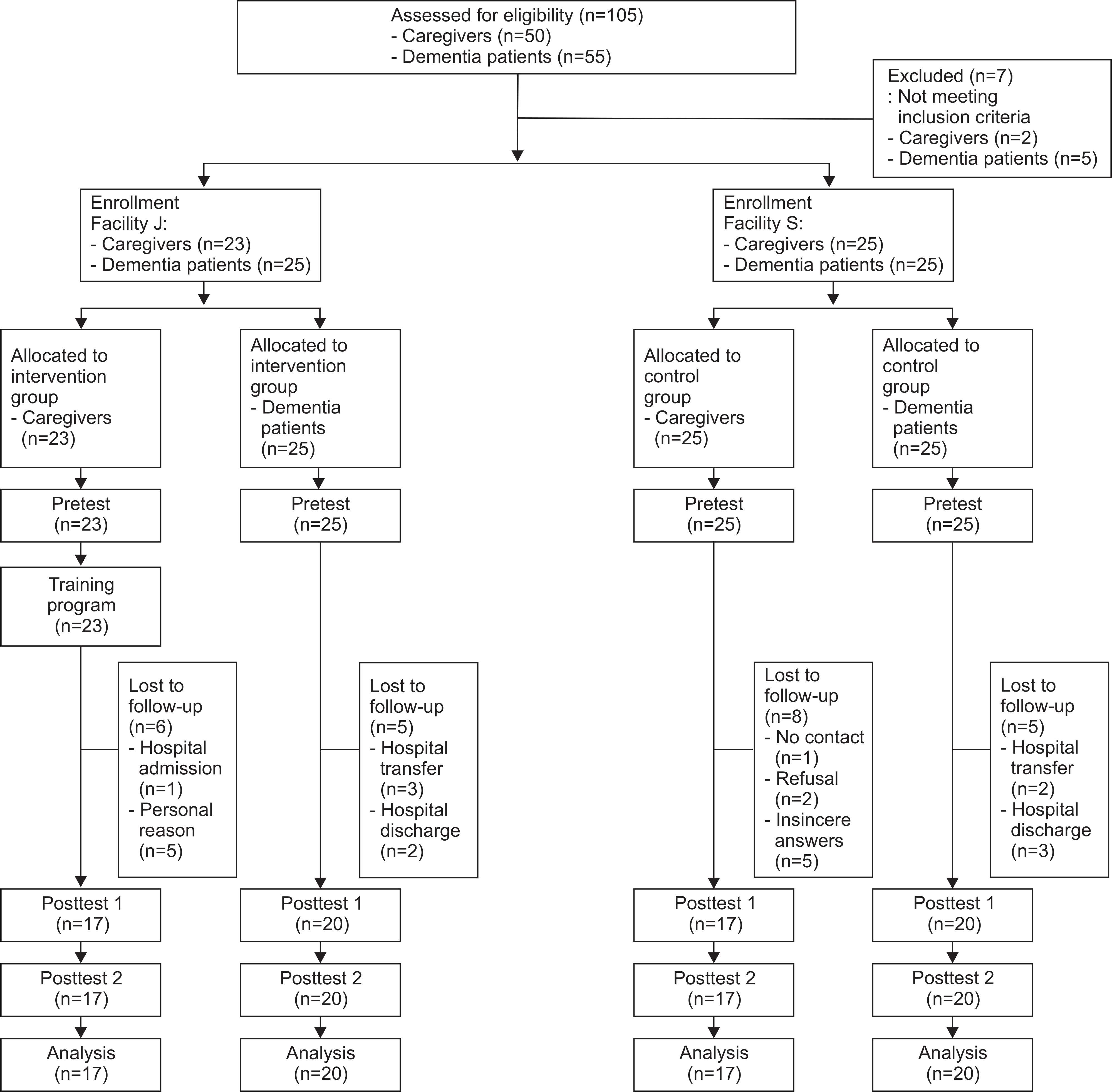Abstract
Purpose
We developed and tested the effects of a coping skill training program for caregivers in feeding difficulty among older adults with dementia in long-term care facilities.
Methods
A non-equivalent control group pretest-posttest design was used. The subjects comprised 34 caregivers (experimental group: 17, control group: 17) and 40 older adults with dementia (experimental group: 20, control group: 20). The developed program was delivered in 4-hour sessions over 6 weeks (including 2 weeks of lectures and lab practice on feeding difficulty coping skills, and 4 weeks of field practice). Data were collected before, immediately after, and 4 weeks after the program (January 3 to April 6, 2016). The data were analyzed using t-test and repeated measures ANOVA using SPSS/WIN 20.0.
References
1. Ministry of Health & Welfare. 3rd comprehensive plan for dementia management (’16-’20) [Internet]. Seoul: Author;c2015. [cited 2015 Dec 21]. Available from:. http://www.mohw.go.kr/react/al/sal0301vw.jsp?PAR_MENU_ID=04&MENU_ID=0403&CONT_SEQ=329062&page=1.
2. Choi ID, Lee YM. Study on the efficient integration of longterm care facilities and geriatric hospitals by using NHIC survey data. Journal of the Korean Gerontological Society. 2010; 30(3):855–869.
3. Chang CC, Roberts BL. Feeding difficulty in older adults with dementia. Journal of Clinical Nursing. 2008; 17(17):2266–2274. https://doi.org/10.1111/j.1365-2702.2007.02275.x.

4. Watson R, Green SM. Feeding and dementia: A systematic literature review. Journal of Advanced Nursing. 2006; 54(1):86–93. https://doi.org/10.1111/j.1365-2648.2006.03793.x.

5. Volicer L, Seltzer B, Rheaume Y, Fabiszewski K, Herz L, Shapiro R, et al. Progression of Alzheimer type dementia in institutionalized patients: A cross-sectional study. Journal of Applied Gerontology. 1987; 6(1):83–94. https://doi.org/10.1177/073346488700600107.
6. Jansen S, Ball L, Desbrow B, Morgan K, Moyle W, Hughes R. Nutrition and dementia care: Informing dietetic practice. Nutrition & Dietetics. 2015; 72(1):36–46. https://doi.org/10.1111/1747-0080.12144.

7. Amella EJ. Factors influencing the proportion of food consumed by nursing home residents with dementia. Journal of the American Geriatrics Society. 1999; 47(7):879–885. https://doi.org/10.1111/j.1532-5415.1999.tb03849.x.
8. Simmons SF, Osterweil D, Schnelle JF. Improving food intake in nursing home residents with feeding assistance: A staffing analysis. Journal of Gerontology: Medical Sciences. 2001; 56(12):M790–M794. https://doi.org/10.1093/gerona/56.12.M790.

9. Amella EJ. Feeding and hydration issues for older adults with dementia. Nursing Clinics of North America. 2004; 39(3):607–623. https://doi.org/10.1016/j.cnur.2004.02.014.

10. Liu W, Galik E, Boltz M, Nahm ES, Resnick B. Optimizing eating performance for older adults with dementia living in long-term care: A systematic review. Worldviews on Evidence Based Nursing. 2015; 12(4):228–235. https://doi.org/10.1111/wvn.12100.

11. Oh JJ. Assisting demented patients with feeding in nursing homes. Journal of the Korean Gerontological Society. 2006; 26(2):315–328.
12. Batchelor-Murphy M, Amella EJ, Zapka J, Mueller M, Beck C. Feasibility of a web-based dementia feeding skills training program for nursing home staff. Geriatric Nursing. 2015; 36(3):212–218. https://doi.org/10.1016/j.gerinurse.2015.02.003.

13. Chang CC, Lin LC. Effects of a feeding skills training programme on nursing assistants and dementia patients. Journal of Clinical Nursing. 2005; 14(10):1185–1192. https://doi.org/10.1111/j.1365-2702.2005.01240.x.

14. Chang CC, Wykle ML, Madigan EA. The effect of a feeding skills training program for nursing assistants who feed dementia patients in Taiwanese nursing homes. Geriatric Nursing. 2006; 27(4):229–237. https://doi.org/10.1016/j.gerinurse.2006.03.007.

15. Chang CC. Effects of a feeding skills training program on knowledge, attitude, perceived behavior control, intention, and behavior of formal caregivers toward feeding dementia patients in Taiwan nursing homes [dissertation]. Cleveland (OH): Case Western Reserve University;2005. p. 1–230.
16. Watson R. Measuring feeding difficulty in patients with dementia: Perspectives and problems. Journal of Advanced Nursing. 1993; 18(1):25–31. https://doi.org/10.1046/j.1365-2648.1993.18010025.x.

17. Liu W, Cheon J, Thomas SA. Interventions on mealtime difficulties in older adults with dementia: A systematic review. International Journal of Nursing Studies. 2014; 51(1):14–27. https://doi.org/10.1016/j.ijnurstu.2012.12.021.

18. Chang CC, Roberts BL. Strategies for feeding patients with dementia. American Journal of Nursing. 2011; 111(4):36–44. https://doi.org/10.1097/01.naj.0000396553.01996.5e.

19. Hong HH, Gu MO. Feeding difficulty and its influencing factors of elders with dementia in long-term care facilities. Journal of the Korea Academia-Industrial Cooperation Society. 2015; 16(2):1240–1252. https://doi.org/10.5762/kais.2015.16.2.1240.

20. Lee J, Ryu SA. Factors associated with feeding difficulty in long-term care facility older adults with dementia. Journal of Korean Gerontology Nursing. 2017; 19(1):1–12. https://doi.org/10.17079/jkgn.2017.19.1.1.

21. Baek SY. Effects of a feeding assistance education on care providers for elderly patients in a geriatric hospital [master’s thesis]. Busan: Busan University;2014. p. 1–98.
22. Park MS, Choi-Kwon S. The effects of oral care education on caregivers’ knowledge, attitude, & behavior toward oral hygiene for elderly residents in a nursing home. Journal of Korean Academy of Nursing. 2011; 41(5):684–693. https://doi.org/10.4040/jkan.2011.41.5.684.
23. Coleman P. Improving oral health care for the frail elderly: A review of widespread problems and best practices. Geriatric Nursing. 2002; 23(4):189–199. https://doi.org/10.1067/mgn.2002.126964.

24. MacEntee MI, Wyatt CCL, Beattie BL, Paterson B, Levy-Milne R, McCandless L, et al. Provision of mouth-care in long-term care facilities: An educational trial. Community Dentistry and Oral Epidemiology. 2007; 35(1):25–34. https://doi.org/10.1111/j.1600-0528.2007.00318.x.

25. Ajzen I, Fishbein M. Understanding attitudes and predicting social behavior. Englewood Cliffs (NJ): Prentice-Hall;1980. p. 1–278.
26. Hui J, Wenqin Y, Yan G. Family-paid caregivers in hospital health care in China. Journal of Nursing Management. 2013; 21(8):1026–1033. https://doi.org/10.1111/jonm.12017.

27. Suominen MH, Kivisto SM, Pitkala KH. The effects of nutrition education on professionals’ practice and on the nutrition of aged residents in dementia wards. European Journal of Clinical Nutrition. 2007; 61(10):1226–1232. https://doi.org/10.1038/sj.ejcn.1602639.

28. Inoue S, Zimmet P. The Asia-Pacific perspective: Redefining obesity and its treatment. International Obesity Task Force. Melbourne: Health Communications Australia;2000. Feb. Report No.: 0-9577082-1-1.
Table 1.
Coping Skill Training Program for Caregivers in Feeding Difficulty of Older Adults with Dementia in Long-Term Care Facilities
Table 2.
Homogeneity Test of General Characteristics and Dependent Variables between Experimental and Control Group in Caregivers (N=34)
Table 3.
Homogeneity Test of General Characteristics and Dependent Variables between Experimental and Control Group in Older Adults with Dementia (N=40)
Table 4.
Effects of a Coping Skill Training Program for Caregivers in Feeding Difficulty of Older Adults with Dementia in Long-Term Care Facilities




 PDF
PDF ePub
ePub Citation
Citation Print
Print



 XML Download
XML Download